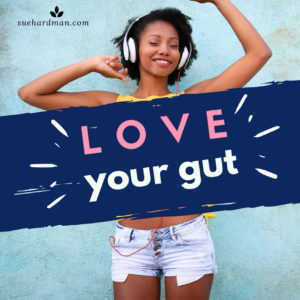 Let’s start with the fact that your gut and the presence of healthy gut bacteria is linked to “the cradle of your immune system.”
Let’s start with the fact that your gut and the presence of healthy gut bacteria is linked to “the cradle of your immune system.”
There are both good bacteria and bad bacteria that live in your gut, that is often referred to as your Gut flora or your microbiome.
More and more research tells us about the importance of gut bacteria. The more we learn about the link between the health of your digestion or gut, the more clear it is that cultivating beneficial gut bacteria is critically important for all aspects of your health and well-being.
Gut bacteria has been linked to weight gain, inflammation and many other disorders, so the importance of a healthy community of bacteria in the digestive tract is very clear. Beneficial strains of good bacteria contribute to strong immune systems, maintaining healthy weight, and even our moods.
The nutritional value of your food is dependent on a healthy gut microbiome because if you can’t properly digest your food, you don’t benefit fully from the nutrients. You’re not what you eat, but rather what you digest.
Bad bacteria can cause inflammation and disease. Even autism is now being linked to undesirable gut bacteria.
The most important function of your gut is to metabolise and absorb nutrients from the food you eat, to nourish ever single cell in your body – your skin, brain, and all organs.
An upset digestive system can actually trigger or worsen acne, inflammation and rashes and can be caused by consuming too many processed foods, sugar or alcoholic drinks.
What does a balanced gut flora do for you?
Good bacteria works hard to keep the bad bacteria in your gut in check. If your gut gets out of balance and the bad bacteria outgrows or outperforms the good bacteria, then you’re more likely going to end up with gut dysbiosis, yeast, leaky gut, candida, SIBO, SIFO, and/or parasites.
You inherited your gut microbiome at birth from your mother, as you moved through the vaginal canal (or not).
After that your diet and lifestyle become more important in their effect on your microbiome. Your microbiome consists of trillions of good bacteria/probiotics that are important for several key functions:
- optimising your digestion
- balances your mood, improve metal health
- hormone balance
- healthy weight maintenance, boosting your metabolism
- supporting your immune system
- synthesising vitamins K and other essential nutrients
- helping prevent leaky gut
- to digest fibre
- supporting nerve function
NEWS FLASH! New research on how probiotics can help you lose weight.
A 2017 Research study – women showed significant weight loss in just 3 weeks. The pre-obese and obese group lost 13.4 pounds, including 4 pounds of fat and 2.6 inches off their waist. The “normal weight obese” group, (body fat > 30%) also saw results — they lost only 1 pound overall but 2 pounds of fat (they gained muscle). I find this really interesting!
What are the causes of your gut flora imbalances, dysbiosis (i.e more bad than good) and leaky gut?
- Sugar
- Stress– physical, emotional, mental.
- Poor Sleep
- Alcohol and smoking
- Medications and Antibiotics!!
- Poor Digestion of food – increasing toxins and the load of bad bacteria in your system, fuelling the cycle.
- Lack of exercise
- Food Sensitivities- Even healthy food can be damaging if one is reacting to it i.e. gluten and dairy.
- And ageing
Over time with long-term stressors, your gut immunity decreases allowing more toxins, chemicals, bacteria and even parasites to compromise the lining of the stomach and seep through to enter your bloodstream.
As your gut flora changes for the worse, your stomach lining becomes more permeable and results in what is now called – ‘leaky gut’.
How do you know if you have dysbiosis?
- Frequent gas or bloating
- Brain fog, anxiety and depression
- Food sensitivities
- Skin issues – acne, psoriasis, eczema
- Micronutrient deficiency
- Chronic bad breath
- Loose stool, diarrhoea, constipation, Irritable Bowel Syndrome (IBS)
- Frequent “stomach bugs,” gastroenteritis, and/or food poisoning
- History of prolonged antibiotics such as for acne or sinusitis
- Carbohydrate intolerance, particularly after eating fibre and/or beans
- Fatigue or low energy
- Achy joints
- Autoimmune conditions – Hashimoto’s, psoriasis, or multiple sclerosis
- Sinus congestion
- Difficulty losing weight
- Cramping, urgency, and/or mucus in your poop once per week
If you have five or more symptoms, there is a good chance you have dysbiosis.
Using probiotics can help with overcoming dysbiosis
Dysbiosis can be tricky to diagnose and even harder to correct, and your rehab program will depend on the state of your gut and how committed you are to make changes.
 Probiotics have been shown to improve intestinal barrier function and reduce inflammation.
Probiotics have been shown to improve intestinal barrier function and reduce inflammation.
- eat your probiotic-rich food such as cultured vegetables, sauerkraut, and kimchi–it’s a great way to jump start gut health repair.
- Choosing the right probiotics
The two most common probiotics to start balancing your microbiome are Lactobacillus acidophilus and Bifidobacteria bifidum – also very helpful for IBS.I would always suggest you take probiotics as a supplement rather than a probiotic drink. Many of theses drinks are loaded with added sugar, not good for controlling yeasts and other negative bacteria in your gut.
This is a good probiotic to start with and have recommend it to many of my clients over the years.
Click on the link to order on amazon, otherwise contact me if you live in a country without amazon to order your probiotic.
Some Research on the benefits of probiotics:
-
One of the first reports, published in 1961 by a physician Robert Siver was using lactobacilli to treat skin conditions. 300 patients who were given a probiotic and found that 80 percent of those with acne had some clinical improvement.
-
Probiotics also have the potential to protect against sun-induced damage. In one mice study, researchers found consuming probiotics provided protection from UV damage. In this study, one group of hairless mice were given oral administrated live Bifidobacterium breve strain Yakult for nine days, and another group consumed fermented milk containing the strain for 14 days. During the final four days of the study, the mice of both groups were irradiated using UV light for each day. Then, after a period of 24 hours, the skin was evaluated to determine elasticity, appearance, and interleukin-1beta levels (a marker for inflammation). The researchers found that there was a significant level of prevention through consuming the probiotics with both groups compared to a control group.
-
Probiotics have been shown to reduce systemic markers of inflammation and oxidative stress, both of which are elevated locally in those with acne.
-
Lactobacillus rhamnosus GG has been found to reduce the severity of atopic dermatitis in those with IgE-sensitive reactions
-
Lactobacillus rhamnosus TB helps with eczema.
-
Lactobacillus rhamnosus SP1 subjects who had acne consumed either LSP1 or a liquid without the probiotics. There was a 32 percent reduction in acne in the treated group, and they also had a 65 percent increase in the IGF1 and FOXO1. The placebo group experienced no changes.
Also maintaining a healthy, balanced diet rich in fibre is incredibly important in ensuring your gut stays healthy, plus drinking plenty of water, exercising regularly, getting enough sleep and trying to minimise everyday stress as much as possible.
The Gut health is also linked to…..
- Your hormonal issues and symptoms may be linked to your gut – due to dysbiosis/Candidiasis.
- The gut has a direct relationship with the liver as good bacteria promotes Phase I and Phase II liver detoxification and the excretion of oestrogen. Bad bacteria interfere with it.
- Stress and high cortisol promotes dysbiosis and dysbiosis promotes high cortisol. Excess adrenal activity interferes with reproductive and thyroid hormone function
- Then there is the direct relationship of oestrogen, progesterone and testosterone and the gut – more complex and less understood.
When you begin to replenish the friendly flora in the gut, you may feel some changes in your digestive system as the microbiome starts restoring a healthy balance. These changes are a positive shift that will bring you amazing benefits.
So now that we know all about the advantages of probiotics, what’s the next step? Probiotics come in all shapes and sizes and are made up of different “breeds” or strains, each of which can have a special benefit.
If you feel you have dysbiosis, leaky gut, skin issues, digestive troubles and want to know how you could benefit from using probiotics – please contact sue@suehardman.com
 or book a FREE mini CONSULT, please call me on +27 72 7903125 or you can
or book a FREE mini CONSULT, please call me on +27 72 7903125 or you can
click HERE and to book your appointment.
I’d love to chat on the phone/skype if you’re looking for more support managing your fatigue, low energy, hormonal imbalances and skin issues.
I so enjoy talking to women and helping them with their health. Please feel free to share if you have friends or family who might need help.

If you want to sign up for my regular updates and newsletter, you can sing up here and get my free gifts.
5 Steps to Great Gut Health & Ditch The Bloat
